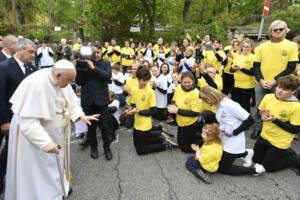
WelCom May 2023
Pope Francis began his three-day visit to Hungary last month, praising the country for its traditional values and making a forceful appeal for European unity, decrying the rise of nationalist populism he faulted for a breakdown in multilateralism.
He also advocated on behalf of migrants in a country with a strict closed-door policy, saying the Christian attitude is one of acceptance and welcome.
After landing in the Hungarian capital of Budapest on 28 April, the pope held private meetings with Hungarian President Katalin Novák and Prime Minister Viktor Orbán, with whom he has often butted heads over the migration issue.
There has been a thaw between the two over Hungary’s willingness to welcome Ukrainian refugees, however, there is still tension of Hungary’s broad anti-migration policy, which some have argued has opened the door to traffickers while authorities look the other way.
Later, speaking to Hungarian authorities and members of the diplomatic corps Pope Francis noted that this year Budapest is celebrating the 150th anniversary of its founding in 1873 through the unification of three former cities, Buda, Obuda, and Pest.
‘The birth of this great capital in the heart of the continent invites us to reflect on the process of unification undertaken by Europe, in which Hungary plays a vital role,’ he said, noting in the post-war era, Europe along with the United Nations committed to forging stronger international ties so as to avoid further conflict.
A staunch advocate of European unity, he called for the recovery of ‘the European spirit’ and urged leaders to embrace ‘the excitement and vision of its founders’.
The pontiff recalled the lofty ideals behind the EU bloc’s founding and lamented that rising nationalism and ‘adolescent belligerence’ had replaced them.
The pope said the dangers Europe is currently facing ‘are many indeed’ and pointed specifically to the war in Ukraine, which shares some 85 miles of border with Hungary, asking, ‘where are creative efforts for peace?’
Referring to ‘the Europe of the 27’, referring to the member states of the European union, the pope said it was ‘built to create bridges between nations’ and requires ‘the contribution of all, while not diminishing the uniqueness of each’.
‘That is the unity we need: the harmony of a whole whose parts are not blandly homogenised, but fully integrated,’ he said.
Pope Francis thanked Hungary for its generosity in assisting Christians facing persecution and hardship around the world, specifically through its financial assistance to countries such as Syria, Lebanon, and Iraq.
However, he also made a strong appeal in favour of a more welcoming policy on migration, invoking a letter from the country’s first king, St Stephen to his son, in which he said strangers ought to be welcomed ‘with benevolence’ and held ‘in esteem, so that they prefer to be with you rather than elsewhere’.
‘For those who are Christians, our basic attitude cannot differ from that which St Stephen recommended’, he said, saying St Stephen’s position is based on Jesus’s own welcome of the stranger in need in the Gospels.
Pope Francis said it is urgent that Europe ‘work for secure and legal corridors and established processes for meeting an epochal challenge that is ineluctable and needs to be acknowledged, in order to prepare a future that, unless it is shared, will not exist.
‘This challenge especially calls for a response on the part of those who are followers of Jesus and wish to imitate the example of the witness of the Gospel,’ he said, and closed his speech assuring his closeness to all Hungarians.
During his pastoral visit, Pope Francis also met with some of Ukraine’s 30,000 refugees in Hungary.
Source: Crux